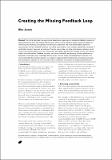| dc.contributor.author | Jacobs, Alex | en |
| dc.date.accessioned | 2016-01-11T17:19:17Z | |
| dc.date.available | 2016-01-11T17:19:17Z | |
| dc.date.issued | 01/11/2010 | en |
| dc.identifier.citation | Jacobs, A. (2010) Creating the Missing Feedback Loop. IDS Bulletin 41(6): 56-64 | en |
| dc.identifier.issn | 1759-5436 | en |
| dc.identifier.uri | https://opendocs.ids.ac.uk/opendocs/handle/20.500.12413/7875 | |
| dc.description.abstract | This article describes how agricultural development agencies can implement feedback systems to hear systematically from the intended beneficiaries of their work. Feedback systems relate to debates on reforming accountability, participatory monitoring and evaluation and social accountability. Based on reasoning and the best available evidence, the article argues that in most projects, quantified summaries of smallholder farmers’ views can be collected. The data can provide real?time performance indicators which create incentives for staff to focus on the priorities of intended beneficiaries. If acted on, this can improve impact and sustainability. Feedback processes can also be inherently empowering. Leading examples are discussed as are three major challenges: ethical issues, practical issues and management incentives. The article concludes that feedback systems can create an organisational link between participatory processes and management systems. As such, they can make a substantial contribution to improving performance. | en |
| dc.format.extent | 9 | en |
| dc.publisher | Blackwell Publishing Ltd | en |
| dc.relation.ispartofseries | IDS Bulletin Vol. 41 Nos. 6 | en |
| dc.rights.uri | http://www.ids.ac.uk/files/dmfile/IDSOpenDocsStandardTermsOfUse.pdf | en |
| dc.title | Creating the Missing Feedback Loop | en |
| dc.type | Article | en |
| dc.rights.holder | © 2010 The Author. Journal compilation © Institute of Development Studies | en |
| dc.identifier.doi | 10.1111/j.1759-5436.2010.00182.x | en |

